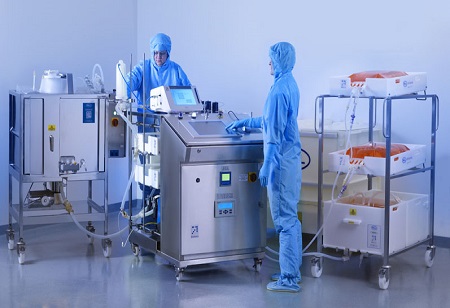Janifha Evangeline | Sunday, 29 May 2022

The biologics market is predicted to reach USD 420.55 Billion by 2025, according to a recent report. Biologics products are subject to numerous laws and regulations which deal with testing, efficacy, patenting, safety & marketing. These products are isolated from natural resources that include animals, humans & microorganisms via numerous cutting-edge technologies & biotechnological methods.
The biologics market comprises sales of biologics and related services by entities which include sole traders, partnerships & organizations which manufacture biosimilars or biologics for treating & preventing cancer & numerous microbial diseases. The biologics market consists of companies that are into the manufacturing of biological products that are derived from human genes & genetically modified proteins. Biologics products comprise a large range of vaccines, gene therapy tissues, somatic cells, and allergenic & recombinant therapeutic proteins.Some of the major trends driving the Biologics market include Robust R&D Higher profit margins for Biologics and revised FDA Regulations that facilitate biologics drug development.
“The surge in digitally-enabled diagnosis and treatment, value-based outcomes, increased regulatory collaboration, etc. reflect the way digital technologies are impacting the pharmaceutical industry,” says Joseph Kiran Kumar, Associate VP & Head IT, Eisai Pharmaceuticals India. Some of the advanced technologies that support digital manufacturing of biologics include: Big data Increased power in processing, as well as information handling, started with the dramatic rise in pipelining, microprocessor speed, & parallelism over the last 20 years and the trend continues with advances in device interfaces and data-handling software information sets which are large & complex that traditional data-processing methods are insufficient refers to the phenomenon of big data.
Furthermore, a key development that enables digital manufacturing of biologics is advanced methods of extracting value from huge data sets and the resulting power will result in vastly improving operational efficiencies, decreasing costs & reduce risks in bioprocessing.
The cloud cloud computing is a key to the future in advanced bioprocessing control and Internet-based systems render shared computer processing power & data on demand. The cloud can allow on-demand access to a shared pool of many configurable computing resources and offer access to resources which are geographically located far from users.
Lean Product and process development While Lean product and process development help in gaining influence in developing bioprocess understanding, practical advances that include cloud computing & solid-state memory
enable the progress. Heightened bioprocess knowledge, as well as establishment of critical control parameters, synergize with statistics-based analysis & design approaches in the product as well as process development. The emerging field of analytical quality by design supports lean product & process development and it comprises, new analytical equipment, testing capabilities, advanced process engineering techniques & science-based approaches.
Sensor technologies The rise in availability of real-time data is feeding improved closed-loop control systems and this will help in altering critical control parameters robustly. The digital revolution in biomanufacturing started with improvements in process monitoring capabilities and lead to generating huge amounts of data that are related to numerous aspects of bioprocessing. Innovations driven by process analytical technology consist of numerous light-based probes & automated cell-free sampling devices.
Progress in, photonics, IT & biochemistry has promoted powerful chemical optical sensors for bioprocess monitoring and even single-use sensors are emerging in designs which facilitate in situ, real-time monitoring of significant culture parameters without sampling. The aforementioned advances are based on numerous physical properties as well as constants of recently engineered materials coupled with the biological components that they measure. An enabling factor that helps in generating near-real-time process information is the availability of single-use, cell-free multiplex sampling technologies.
Earlier numerous culture-monitoring & potentially controllable process attributes were ignored often owing to the unavailability of near-real-time digital data. However, this is changing. For instance, the Biacore SPR system of Cytivia can characterize monoclonal antibodies in terms of their specificity, affinity, kinetics, and concentration. Other new systems can render near-real-time concentration measurements of bioprocess components by leveraging a calibration-free concentration analysis method.
Process Control Increased processing speeds, the large amounts of process data available & advanced algorithms, are transforming the scope & power of process control systems. Also, adaptive ‘fuzzy experts’ systems use Artificial Intelligence to offer powerful & robust models which predict operation control. This is important in bioreactor control as cells change their ambient culture media & respond dynamically to the resulting changes. The foundation supports brilliant software which implements new mathematical, statistical & logical algorithms.
For instance, the UNICORN system control software of Cytiva offers built-in knowledge for planning and controlling process runs and it is done by analyzing results from numerous bioproduction operations. Such kinds of software are perfect for use in regulated environments owing to the provides traceability and backup functionality they provide. Other than that, distributed control elements and supervisory systems are facilitating organizations to consider exciting innovations that include end-to-end continuous biomanufacturing.
The road ahead While many companies across the globe are leveraging the benefits of technologies in biologics manufacturing and an understanding of likely challenges, common pitfalls can help these organizations navigate a successful migration to technology solutions.